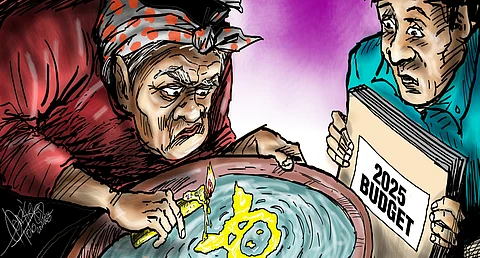
- NEWS
- the EDIT
- COMMENTARY
- BUSINESS
- LIFE
- SHOW
- ACTION
- GLOBAL GOALS
- SNAPS
- DYARYO TIRADA
- MORE

The hunt for the insertion agents in the final version of this year’s budget, which led to the almost unlimited pork barrel used in the midterm polls, has become murkier, as a House member now claims the alterations took place in the chamber.
Following the trail from the discovery of the blank items before the submission of the enrolled version of the 2025 General Appropriations Bill led to the shut doors of the bicameral conference committee.
Budget realignments are the principal source of the pork barrel, which became prevalent after the Supreme Court declared the Priority Development Assistance Fund (PDAF) unconstitutional in a 2013 ruling.
Outlawing the pork barrel in the yearly budget, however, resulted in the unlimited creation of discretionary funds hidden in budget insertions.
A consensus is building in the House of Representatives to reform the budget process, with many of the representatives taking the cue from President Ferdinand Marcos Jr. to align the 2026 budget bill with the National Expenditure Program (NEP).
The sentiment of some chamber leaders is that the “mysteries” of the 2025 budget, notorious for containing pork insertions, must be cleared before deliberations on the 2026 General Appropriations Bill could begin.
Navotas Rep. Toby Tiangco has sought the record of the deliberations on the 2025 budget, including the panel meetings where the insertions might have started.
The leadership of the previous Congress’ appropriations committee is being asked to provide details on what transpired during the debates, from the start, including in the small committee, where the horse trading was believed to have been initiated.
“The only way for the people to believe the proceedings were legitimate is if the leaders of the Committee on Appropriations at the time, and those of the small committee, answer why some agencies lost funds and others gained funds,” Tiangco said.
Tiangco indicated that while the primary suspect in the multiple insertions was the bicameral conference committee, it nevertheless was able to produce a report.
“The bicam has a simple report where it is written what the original budget was, what was added or deducted, and what the final budget was,” Tiangco said.
Asking members of the small committee to explain would be the first sign of seriousness when it comes to making the budget process transparent.
“It should be the congressmen who should answer those questions (about the budget insertions),” he added.
In the last House budget proceeding, the small committee was granted the power to make changes even after the bill had been approved on second reading.
That’s why it is important to hear the small committee members to fill in the mysterious gaps in the 2025 process.
Aside from allowing civic organizations to observe the House proceedings, Tiangco said independent House members should be allowed representation in the deliberations.
“That’s the reason I asked who makes up the Committee on Budget Amendments. The majority, the minority, and political parties are all represented. But there are also independent congressmen, right? So why not give us, even just one, a chance to be part of that subcommittee?”
Thus, the quest for integrity in the drafting of the most important law that Congress produces annually continues.
Unmitigated greed associated with the legislative chambers, however, casts a shroud of doubt that the pork insertions could be controlled if not stopped, despite the brave statements about ending the scourge.
